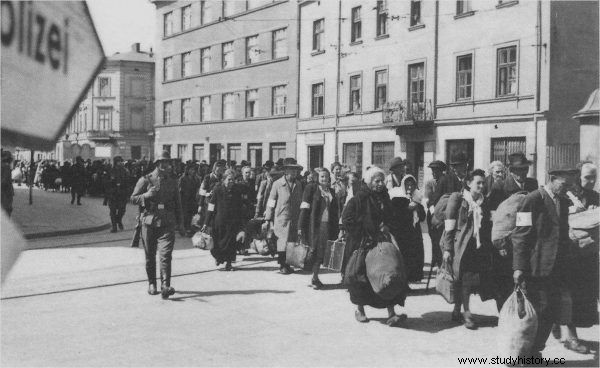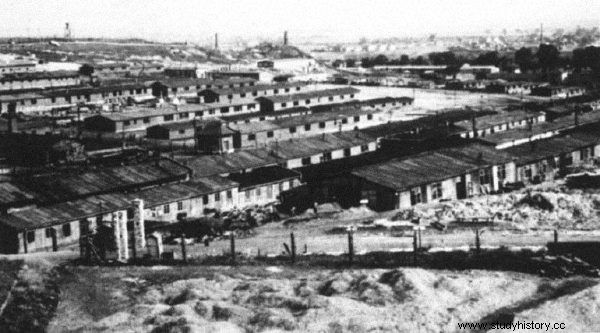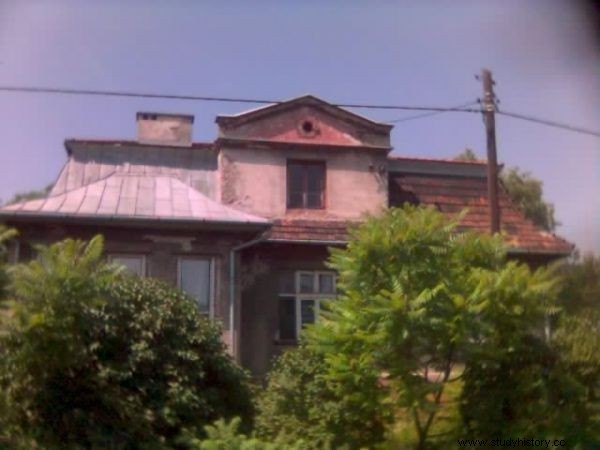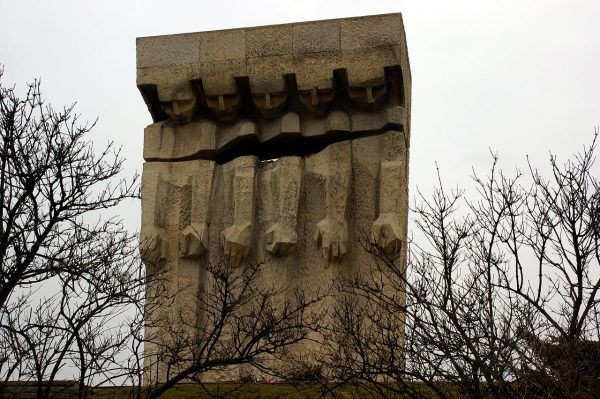Amon Göth, commandant of the labor camp in Płaszów, had his morning routine. When he woke up, he grabbed binoculars and a gun, then shot prisoners who he thought were working too slowly. It was just one of the many horrific atrocities he had committed. How many people died at his hand?
The future commandant of Göth, born on December 11, 1908 in Vienna, son of Bertha and Amon Franz, received his unusual name after his father and grandfather. Amon was the Egyptian god of fertility and fertility. It is believed that he made the crops plentiful and people and animals to reproduce.
The fact that one of the greatest Nazi criminals was named in his honor is ironic. The Austrian brutality, portrayed by Steven Spielberg in "Schindler's List", was exceptional - even by the standards of the cruelty SS.
Exemplary opinion, fast career
The superiors in the SS had a very good opinion of Göth, and not only because of his pure Aryan blood. His thorough education, brilliance, the ability to clearly judge the situation, as well as his willingness to make sacrifices for the cause were appreciated. This made him an exemplary National Socialist . Promotion was only a matter of time.
The man was appointed the commandant of the forced labor camp in Krakow's Płaszów. He arrived in the capital of the General Government in February 1943 and immediately went for the first construction inspection. He took up his function on the first day of the camp's operation.

One of the first tasks that Amon Göth received after arriving in the capital of the General Government was to coordinate the liquidation of the Krakow ghetto.
He gave vent to his sadism from the very beginning. His actions, subordinated to extreme changes in mood, were often illogical. In the case of ordinary people, this could only contribute to personal problems. In Göth's case, resulted in the death of innocent people.
Liquidation of the Krakow ghetto
As the Austrian was characterized by an unscrupulousness and exceptional consistency in action, he was entrusted with the task of coordinating the liquidation of the Krakow ghetto. Some of the people unable to work were to be killed on the spot or sent to death camps. The rest were sent to Płaszów as a free workforce, living in conditions that degrade humanity.
The meanders of the commandant's sick psyche made themselves known when he chose the date of the liquidation. He decided to do it on the Sabbath, March 13, 1943. To the Nazis gathered in the main square of the ghetto (Plac Zgody), he explained that it was a very important day. Here are Jews who have been in Krakow for hundreds of years will finally leave the city .
People able to work (those from sector A) were evacuated. The old and sick in Sector B were often killed where they were found. A similar fate befell the children from the infectious diseases hospital. When one of the nurses pointed out that they were not allowed to go out onto the street because they could infect, the young patients were shot dead in their beds. About 2,000 people were executed on the spot, and the same number was sent to death camps. And the commander was able to say the very next day that he had completed the task entrusted to him without any charges.
An unscrupulous alcoholic
Among the prisoners of the labor camp, Amon Göth was terrified even by his appearance. A tall and bulky alcoholic, people left no hope of survival.
Once, while the buildings were being erected in Płaszów, one of the prisoners, the architect Diana Reiter, noticed that the foundations had been improperly made. In her opinion, they were too shallow. She decided to explain this to the commander because, as a specialist, she knew that otherwise the barrack that was just under construction would simply collapse. The man listened to what she had to say and then had her shot on the spot . Later, he commissioned the construction according to her instructions.
Like many Nazis, especially those working in German camps, Göth had no mercy for the children either. It even seems that he had exceptional satisfaction in sending them to their deaths. Jesús Hernández in the book "Nazi Beasts. Executioners of the SS ”says:
Göth's cruelty in his conduct could reach limits that were difficult to understand. When groups of children were sent to extermination camps, their mothers were forced to stand still and silent while their offspring wandered off on their way to death. Göth issued an order for the camp orchestra to play children's songs at that time .

A labor camp in Płaszów. It was commanded by Amon Göth.
His "hunts" for Jewish prisoners who worked too slowly were also famous. The commandant had a terrifying habit, also shown in Spielberg's film. As Hernández writes:
He would go out shirtless in fine weather. He appeared with binoculars in one hand and a sniper rifle in the other. Cigarette in his mouth, he calmly watched through the optical sight of prisoners walking a few hundred meters from the house, pushing heavy wagons loaded with limestone. The one who, according to Göth, was not working hard enough was shot immediately.
Death by one flea
Göth was able to order executions (or to carry them out himself) for extremely trivial reasons. For example, the highest punishment was imposed on a girl who, while cleaning a garage , dared to ... look in a car mirror . On the other hand, one day two women, a mother and a daughter, lost their lives because, according to the commandant, they peeled potatoes too slowly. Another time, a Jewish cook was killed for the food he served was too hot. There are many cases of this kind. Jesús Hernández lists:
His shoe shoe was killed for failing to make the commander's officers shine enough. Göth hanged on hoops in the office of the orderly Poldez, only fifteen years old, because he found a flea in one of his dogs, (...) he also ordered his servant Liśek to be killed for borrowing a horse without permission.

This is how the villa in which Amon Göth lived during the occupation looked like in 2007.
To one of his servants, the cook Helen Hirsch, the Nazi monster said, "I beat you because you dared to ask me why I was beating you." In fact, he was furious because the woman had just started working for him and didn't know she should leave the bones from the dog's dinner. The supervisor constantly harassed and intimidated her, and tried to rape her. She was saved by his lover, Ruth Irene Kalder, who was at home at the time. Helen, however, kept her life. He needed her - she just cooked very well.
The beast from Płaszów is in danger
From the very beginning, Göth felt completely outside the law in Płaszów. The authorities of the Third Reich did not mind how they treated prisoners who manufactured weapons for the Third Reich; however, they did not look at his other doings through their fingers. Meanwhile, the commandant turned out to be extremely vulnerable to corruption.
He sold a large amount of furniture after the liquidation of the Krakow ghetto, and sent the rest to his home in Vienna. Part of the food intended for Jews working in Płaszów was also sold on the black market. He also scooped up a lot for himself, to have something to feed the guests during lavish parties .
Despite the overestimation of the production results, after the inspection, the commandant's position was not the same as before. And so what if he was ruthless and extremely effective if confidence in him was lost? At one point, he was even banned from arbitrary decisions on the execution of prisoners.

The SS superiors didn't care about Amon Göth's crimes, but his sticky hands made him lose the trust of his superiors.
This does not mean, however, that from now on Göth no longer had human blood on his hands. In May 1944, he was allowed to make a selection in the camp, which was becoming overcrowded as prisoners from liquidated institutions were transferred there. He eagerly joined the action. He did the task in his own, sickly fantasy way. As Jesús Hernández writes in his book Nazi Beasts. Executioners of the SS ":
While the sounds of Strauss waltzes or love songs streamed from the megaphones, the inmates had to run naked, in huge circles in front of tables from behind which SS doctors they caught the sick or the weak . They were then ordered to come to tables where their names were noted (...).
After the selection, about 400 adults and nearly 300 children were taken to Auschwitz. Fortunately, some of the youngest ones managed to hide in barracks for typhus patients, which the Germans did not enter for obvious reasons, and in latrines.
Scary Summary
The degenerate from Płaszów tried to conceal the scale of his criminal activities. He even ordered the bodies of prisoners buried in the camp to be excavated and burned. Not all of them were removed - human bones are still found in this area. We also know that over 8,000 people died in the camp.
To this tragic list, we should add the victims who were sent to Auschwitz, as well as people unable to work, killed during the liquidation of the Krakow ghetto. It is estimated that the commander himself murdered a total of about 500 people .
Eventually his terrifying career came to an end. On September 13, 1944, Göth was arrested by the RSHA, the Reich Security Main Office. He could not explain the origin of the 80,000 marks that were found in his apartment in Vienna. They proved that he was plundering the Jews out of his mind.
The psychopathic Austrian was imprisoned, but he quickly left it for health reasons (he suffered from diabetes, among other things). He certainly hoped to avoid responsibility - not only for the theft, but also for genocide. When he gave American soldiers a false name in 1945, they were not fooled. The former commander of Płaszów was brought before a Polish tribunal. In a trial held at the turn of August and September 1946, he was sentenced to death by hanging. The sentence was carried out on September 13, 1946 in Kraków.

Monument to the Victims of the Concentration Camp in Płaszów. Many of them died at the hands of the sadistic commandant.
There is no justification for Amon Göth's atrocities. He himself explained that as a child he did not receive enough attention from his hard-working parents. He also lost two children (from his first and second marriage). It seems, however, that it was not personal tragedies that shocked him so much - those children who were still alive were not even visited by the unpredictable Nazi.
Certainly the volatility of his moods was due to his alcohol abuse. He was even more aggressive and unpredictable after drinking. It seems almost certain that he just had a lot of fun from bullying, intimidating, hitting and finally killing .
